Cape Gooseberries: The Plant that Fruits Year Round - Planting and Harvesting Seeds
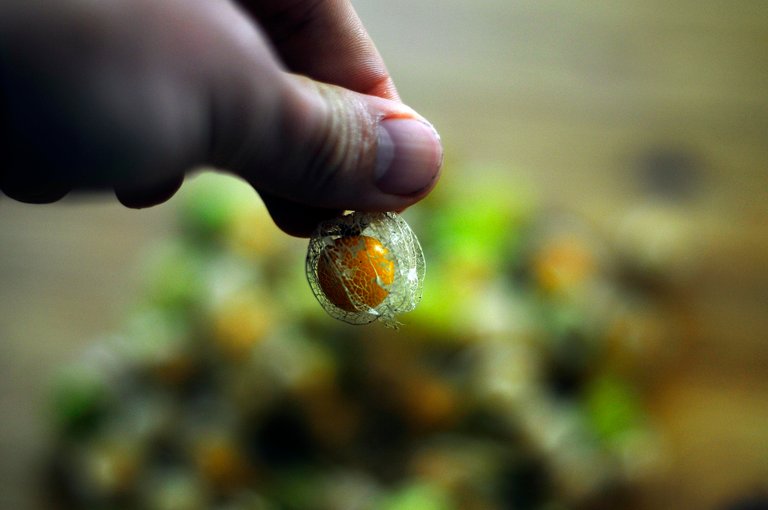
It is often said that we are what we eat. I think this statement rings even more true in modern times. We are bombarded with "natural" food wrapped in plastic and marketed as good for us. But we have, in some sense, lost touch with reality and nature. For most people, healthy and natural products are simply a separate aisle in the shop. It is simple food that is "not mass-produced". And this is in some sense better than eating said mass-produced food. That is, if you have the option between a carrot and a pack of chips, the carrot will look like the better option. But in philosophy, we will call this a false dichotomy. I think that we have lost touch with nature because of this false dichotomy, we have lost the third option: food that is grown locally, in season, and "as nature" has intended it. And this process is, I think, natural medicine in and of itself. If you have the means, seeing something grow, being part of the process and seeing what nature does, cannot be sold in the form of a mass-produced pill, not packaged in plastic and sold to you as a healthy food option.
Enter the Cape Gooseberry.
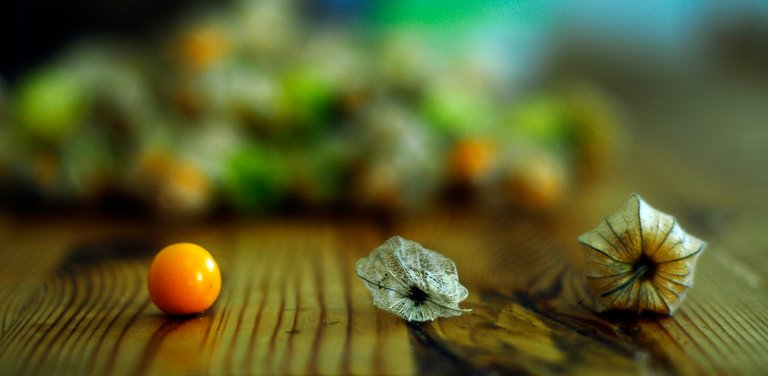
Eating Seasonally
Lately, I have been fascinated by the idea that our bodies adapted along with nature regarding the seasons. I have seen this first hand as a gardener and it has me boiling sometimes. I have tried to grow rocket/arugula out of season and it never works. But year-round you can find it in the supermarket, albeit a sad-looking product. Demand and supply I guess. But it had me questioning if we really needed rocket in the summer (as it grows in the winter here). Now I ask myself: does my body need it? Is it healthy to eat something that is out of season? Does food still play the role of medicine if I eat it not as nature has intended it to be? I think the jury is still out on this question, and the question might not be that much of interest to people. People often look at me funny when I tell them this. But I digress. Enter again the humble Cape Gooseberry.
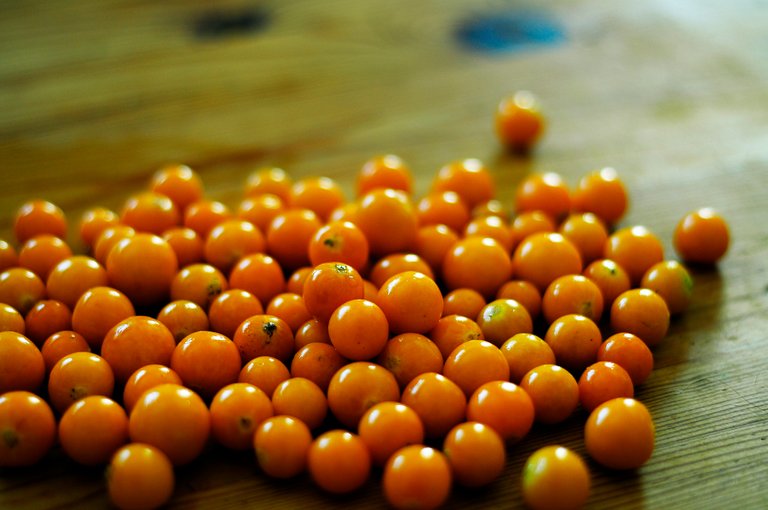
The Cape Gooserry: A Year-Round Fruiting Plant
The cape gooseberry or goldenberry (Physalis peruviana) is a simple-looking plant but its fruit packs a punch flavorwise. A flavor that is hard to describe, few people have enjoyed it either because it is too expensive or that it is not grown there. All parts of the plant is poisonous, and the unripe fruits are also poisonous. According to the Plants for a future website,
The fruit is rich in vitamin A (3000 I.U. of carotene per 100g), vitamin C and some of the B complex (thiamine, niacin and B12). The protein and phosphorus levels are exceptionally high for a fruit.
(Apparently, the fruit has vitamin B12 in it, I have heard this from more than one source, however, I have not found any studies confirming this information.)
The plant or shrub carries fruit throughout the year. This makes it an awesome plant to have when you follow the seasonality diet. I love this fruit because it has spread throughout my garden like a weed. So every time I am gardening and I find a fruit, it is like a snack straight from the source. I call them nature's candy because of their sweetness and size. If I get a good harvest, I eat them by the handful.
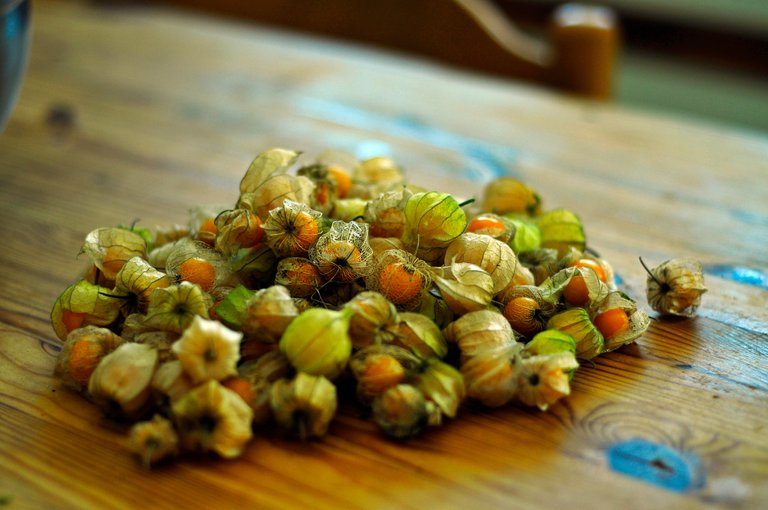
Back to where I started with the post. I know these berries are sometimes very expensive. And it is always so interesting to see that people sell them without the "cape" or the lantern husk. The fruit comes in this protective husk or cape and they are sold without it. In my own experience, the fruit spoils much faster without it. As soon as you take it out of the cape, the fruit spoils in two or three days. (That is if the fruit is at peak ripeness.)
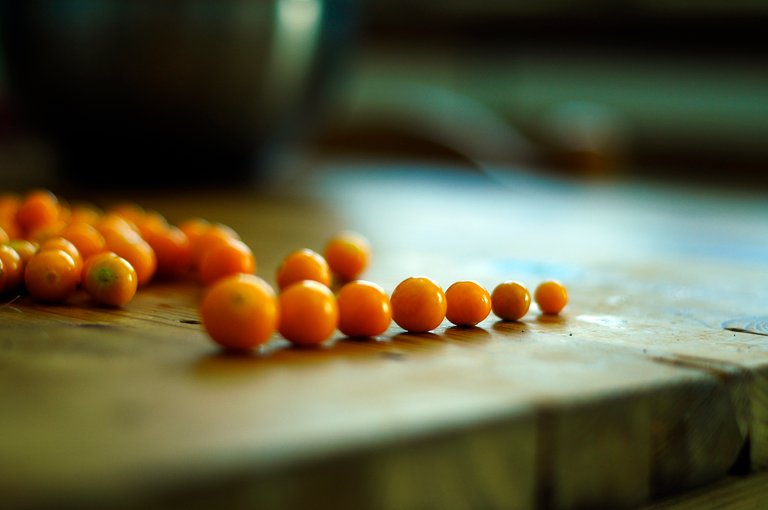
But also, getting back our touch with nature, and the medicinal component thereof (mental health specifically), I find that growing your own food helps with reconnecting you. Planting a seed and seeing it grow into a plant, and then harvesting the plant or the fruit is the most satisfying thing and it helps you connect with nature. Recall the false dichotomy I mentioned. People either think there is unhealthy food or healthy food, and that food comes from the supermarket. What if healthy food actually consists out of food that we are connected with? What if healthy food is actually food we know the story of? I know that not all of us can grow our own food, but does that mean that we need to give the responsibility over to someone that does not necessarily have our best interest at heart? These are the type of questions I ask myself when I garden.
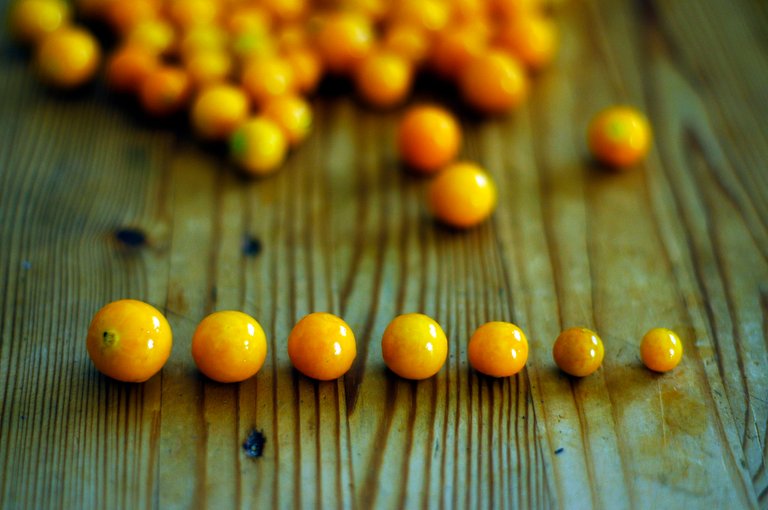
But let me pause the philosophical and political talk, and show you how I (i) harvest the fruit, (ii) save some of the seeds, and (iii) plant new plants.
Harvesting Cape Gooseberries
I think one of the other names for these berries is "ground berries/cherries". I can only speculate on this fact, but I think it has to do with the berries falling to the ground when they are ripe. I always pick them from the ground and never from the shrub or plant itself. When they fall to the ground still protected by the cape or lantern husk, they can be there for weeks. I think they are good for up to four weeks. I have found some where the husk has withered away, but the fruit is still good, and so sweet and good.
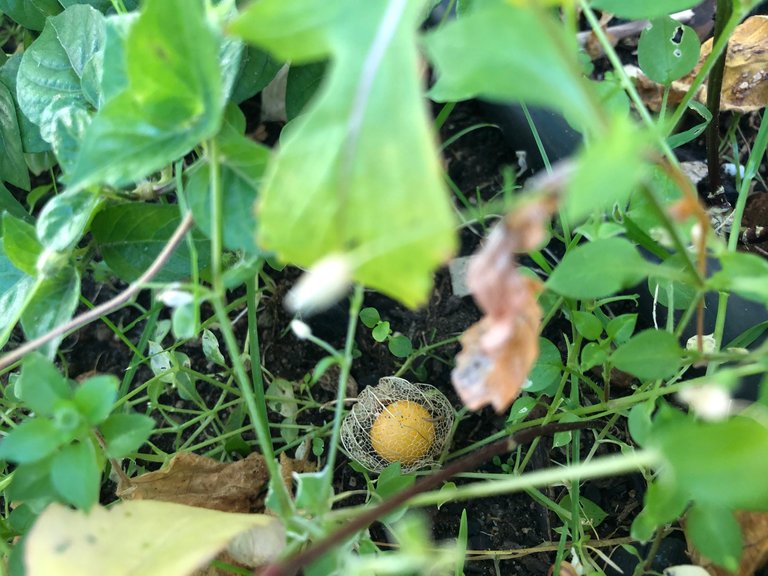
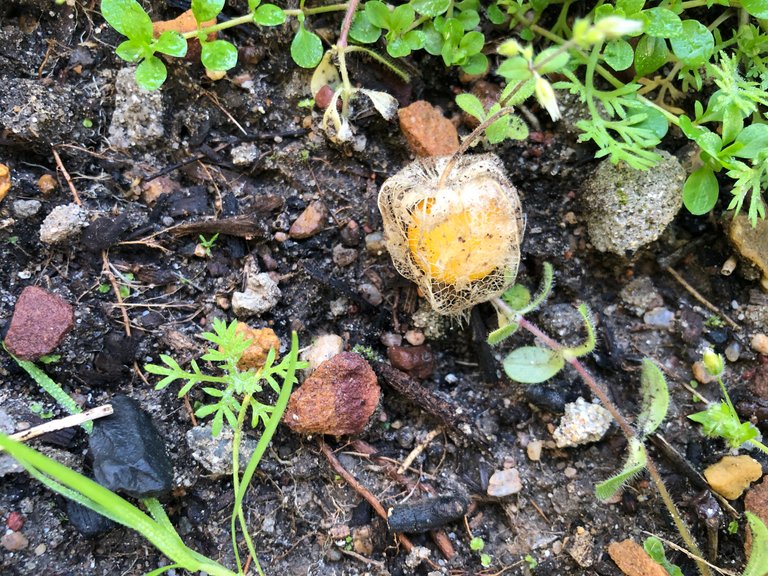
Here you can see that the husk has degraded but the fruit is still good.
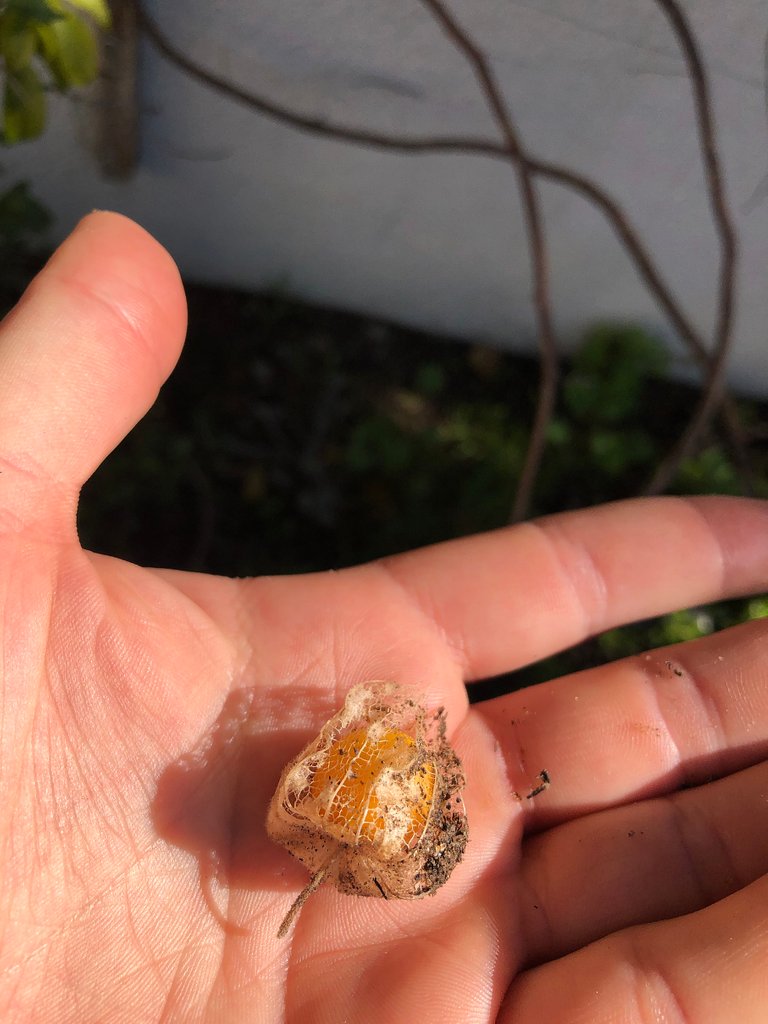
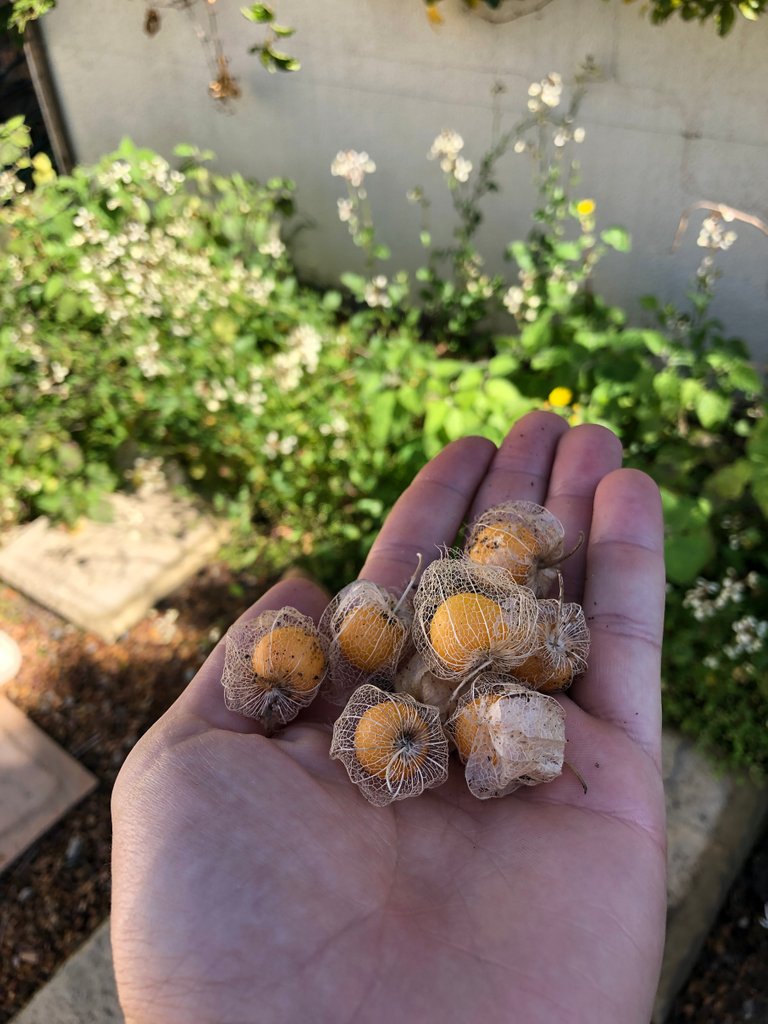
I let the chickweed grow over the fruits, and I found that this protected most of the berries from the birds and squirrels. I also planted various plants throughout my garden so as to "fool" the animals. This particular patch is left untouched. Even after this relatively "big" harvest, see how many fruits are still left on them.
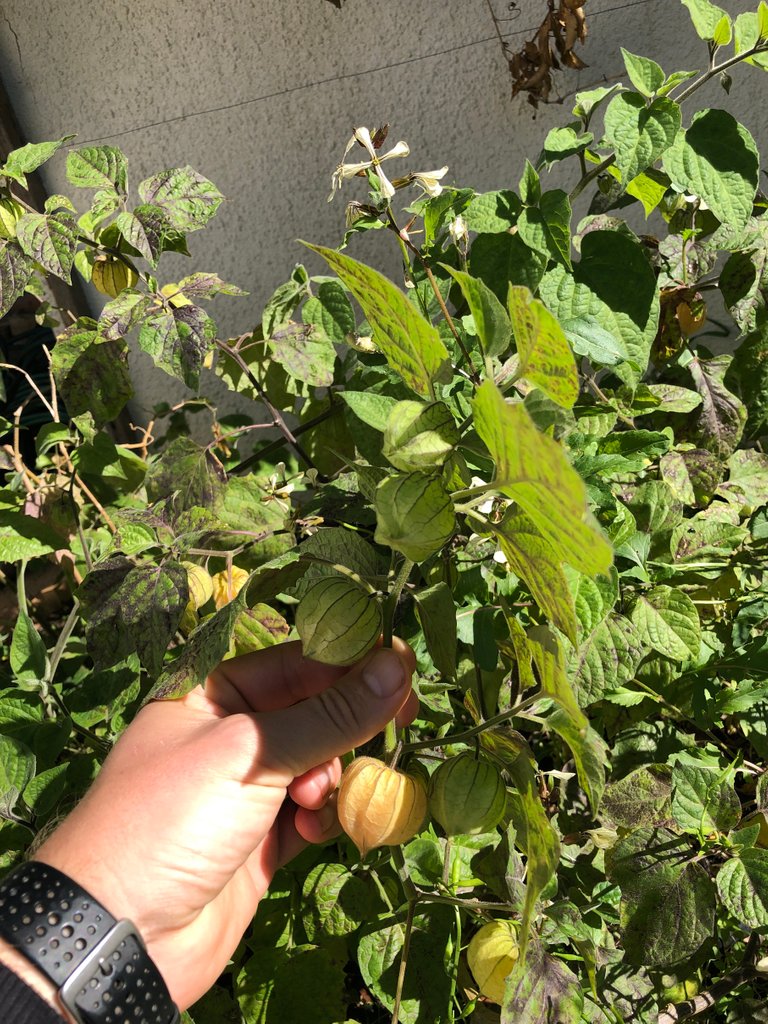
And the patch that survived. The leaves are not all that happy because this spot does not get that much sun, and we had lots of rain. The other patches around the garden that get more sun looks healthies, but all the fruit are "stolen" by the birds and squirrels.
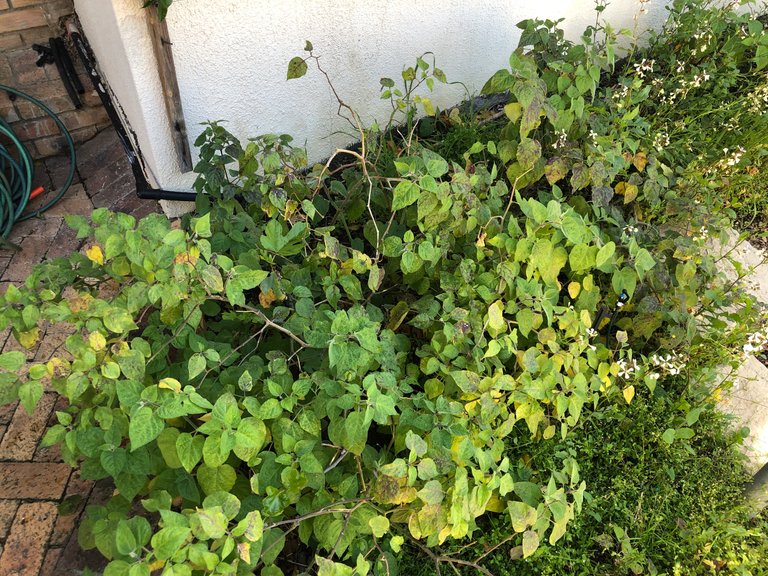
Saving seeds
It is important to save some of the seeds for the next patch to grow. The plant can be cut down and it will regrow again. I do this with some of the plants. But sometimes I just regrow a patch. The seeds have also gotten into my compost heap and thus spread throughout my garden.
It is very simple to harvest seeds and store them. Cut the fruit open, take a knife, and "scrape" the seeds out, and put them on a paper towel. The next morning they will have dried out and are ready to be planted.
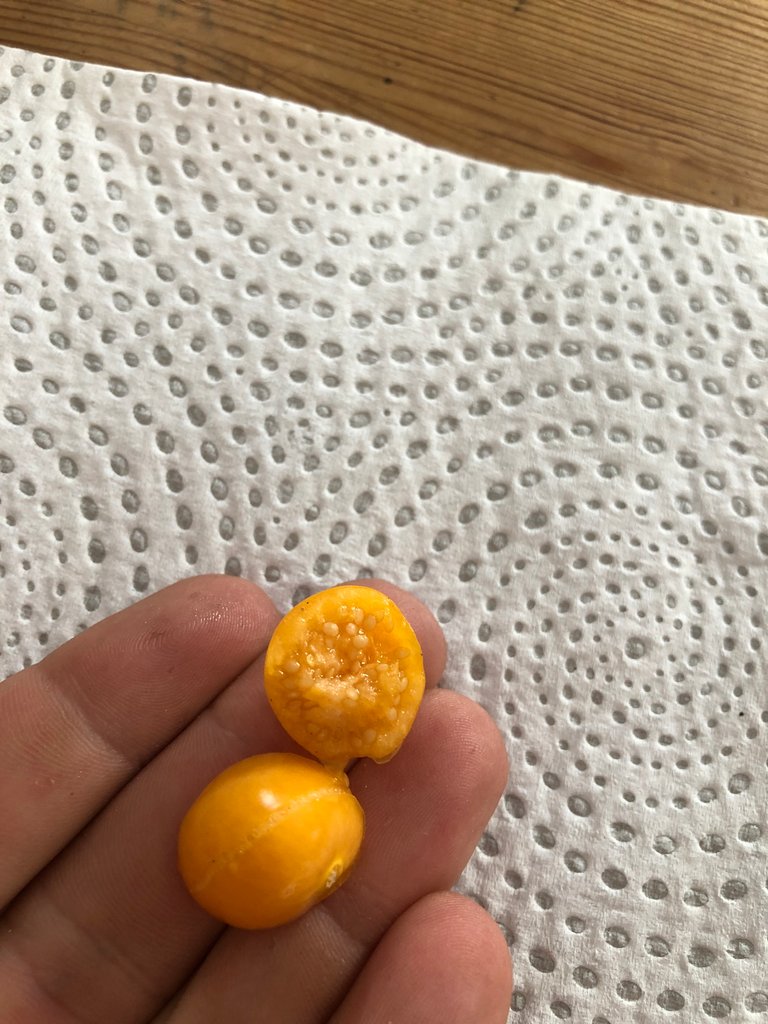
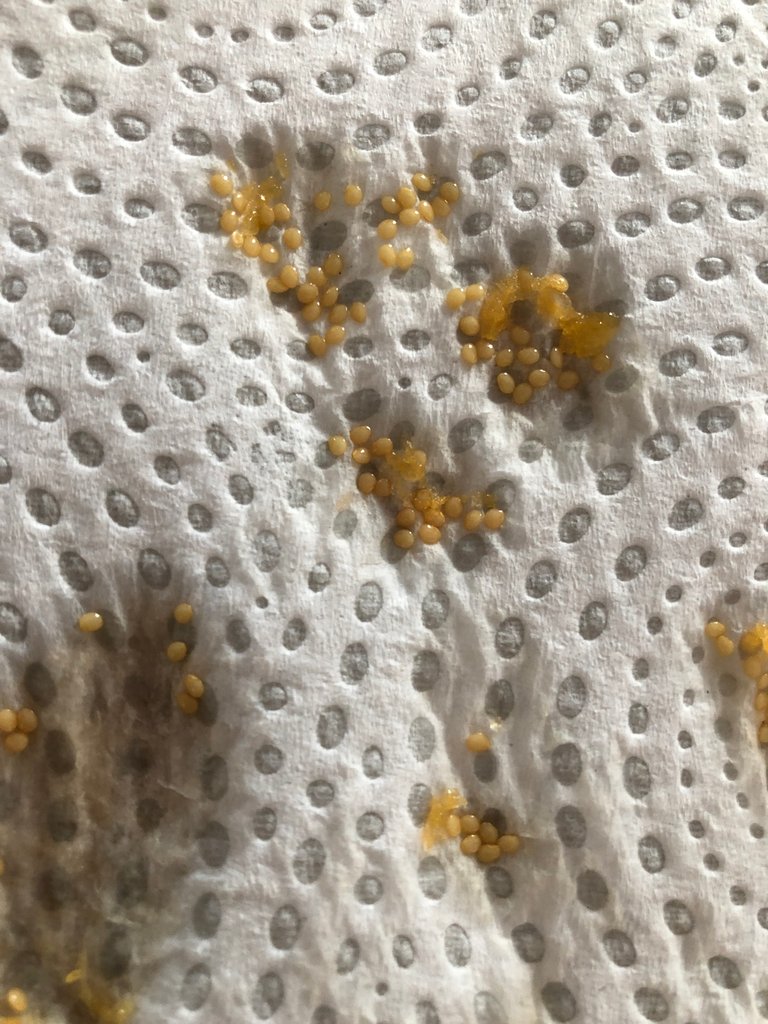
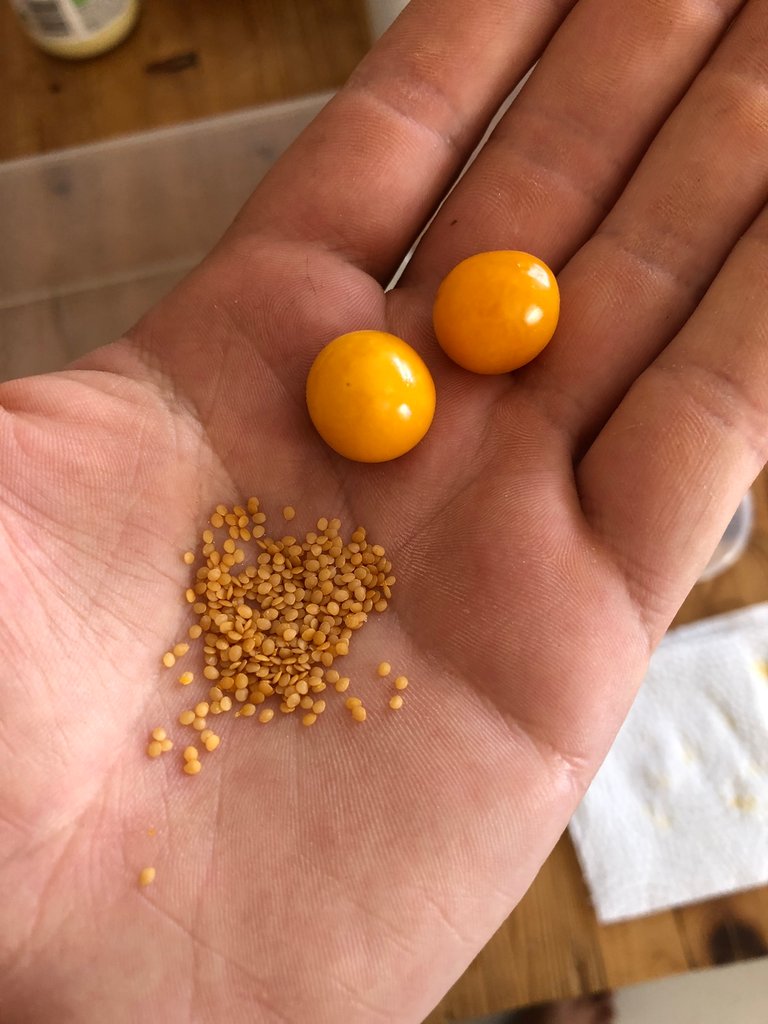
Planting new plants
As I said, these plants have spread throughout my garden. I actually see them as "weeds". But from time to time, I save the seedlings and plant new patches. Here I planted three new plants in the same area as the picture above (the one that has too much shade). I hope that they will produce some nice fruits!
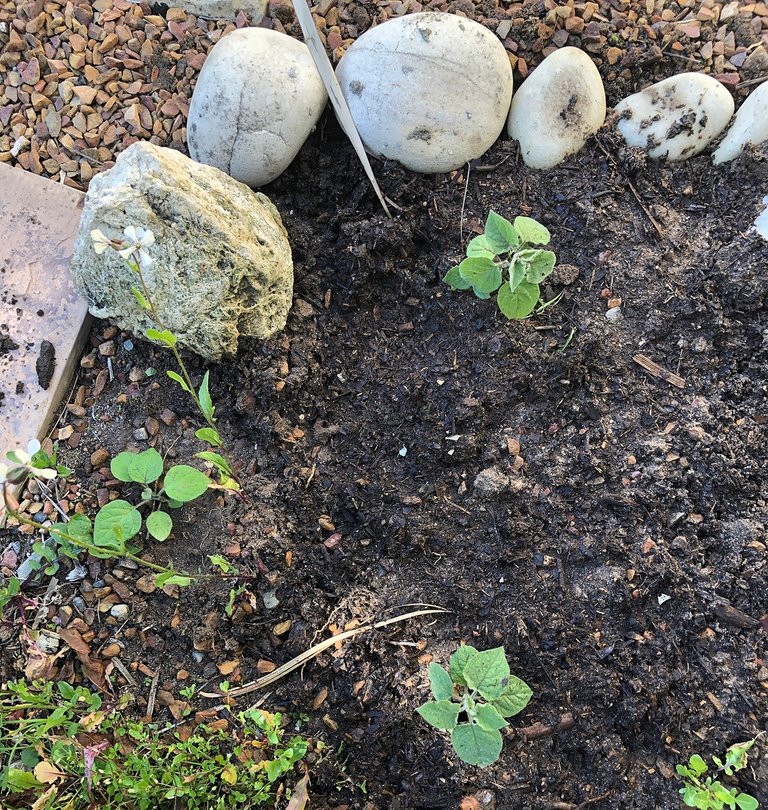
Connecting with Nature as Medicine
Scientifically we can measure so many things. But can we really measure the worth of gardening, seeing how plants grow, making your own compost, and harvesting the fruits of your labor? Again, this is a very philosophical question. I am not sure if there are answers. And I am not sure that we would ever be able to measure it. There are countless things that go into growing your own food and treating your mental health by getting connected to nature. And I do not know if we really do need an answer. All I know is that picking fruit, or harvesting a leaf, or seeing a flower bloom because you cared for it, made space for it to grow, or simply looked at it flourish, is something special and immeasurable.

Congratulations @fermentedphil! You have completed the following achievement on the Hive blockchain and have been rewarded with new badge(s) :
Your next target is to reach 90000 upvotes.
You can view your badges on your board and compare yourself to others in the Ranking
If you no longer want to receive notifications, reply to this comment with the word
STOPCheck out the last post from @hivebuzz:
Here in Thailand they sell them always in the protective husk. Yes, we love them in salads with rocket and roasted green pumpkin kernels. Super nice post.
Following you from Chiang Mai and look forward to more of your content. 😊
Thank you so much for the compliment! It is good that they sell it in the husk. I have never seen them being sold in the husk and it is a very common fruit here in South Africa. I am going to look at your content tonight 😀
I am growing these for the first time this year. It took long for them to get to the flowering stage. I can't wait to try them! My mom always told me how egg she was little she would eat the wild ones that grew back home.
They are really nature's perfect sweet/gift! I am rooting for your's to flower and that you harvest a bunch! If you succeed, save some seeds and grow many more plants! I have never tried because they are technically a weed in my garden by now, but you can make and grow new plants via cuttings?
Oh yes, I've made a few clones from some cuttings of some suckers.
I am curious, did they take? Or did you manage to grow plants from them? If this is a good technique I might try this!
Yes, they did survive! This trick works for tomato sucker cuttings, too.
Even better! Thank you. I have one tomato plant that started now. So I am going to try it with the tomato. I am struggling to successfully grow tomatoes.
Beautiful post. I agree. Over the years we have lost the connection with nature and real food. Nothing more rewarding than getting your own fruits, vegs and herbs from the garden.
What I have learned about unfermented plant foods that contain B12 is that it is usually a b12 analog we humans cannot use.
Have a beautiful day and happy gardening 💚
I think I have seen recipes that make fermented gooseberries (either a wine/beer/cider) or fermented jam. Maybe that unlocks the b12 then? I am no expert.
But thank you so much! I really appreciate your comment. And yes, we have lost that touch and the actual touch of our hands and the ground and the feeling of the plants too.
Have a beautiful day as well and happy gardening 😀
Not only knowing the story of the food is part of the healing process, working the soil, feeling it with your hands (and hopefully your bare feet, process known as grounding) is great medicine. Loved your post and your way of thinking, followed!
Thank you so much! I really appreciate it. And yes, the grounding theory. I walk barefoot every day in the garden (grass, and compost) even when it is dead winter. Wearing shoes makes me literally feel "disconnected". Touch, smell, being/sensing. Working with soil is so important, and I neglected that part in the post. Happy soil = happy plants. And I think it is more accurate to state that we are farming with soil rather than plants. Thanks again for you comment!
Nature is perfect, I particularly love it, the feeling of freedom is unique and the crops that come out of it more, on this platform I have seen with great joy that more and more of us are cultivating it.
Greetings
Thank you for stopping by. We need to. Too many people are turning a blind eye, or simply do not care. We are a select few who truly care and actively try to make it better. Greetings, and stay safe.
Esperemos que cada día seamos más.
Hope is all we have my friend.
AMEN
You know, recently a old man was telling me, berries are nature's gift to us for protection, and they contain all the essential nutrients that helps our immunity. Nature produces various berries in different seasons and there is a purpose behind it. He still goes to the jungle and searches for berries. Unfortunately, mankind is little concerned about the nature and the jungles are disappearing.
Can you ship some seeds ?
That is so true my friend. And I think these berries are very high in anti-oxidants.
It is so sad yes, we as humans can do so much good but we decided collectively to follow greed and not compasaion.
I am not sure about the legality of shipping seeds. But I see you are in India. You get gooseberries there as well, but another type? They sell the powdered version here, we call it Amla powder. Are they maybe called Amla berries?
Amla is different - will need to search.
I see that Amazon India has some seeds available, maybe that is an option?
Ya, definitely, I will get them from Amazon. Can you share the link, you saw ? I saw one, but reviews tell, they are not genuine.
I am sorry, I see the reviews are very bad. I never looked at the reviews! Do you know if they sell the fresh fruit anywhere near you? Easiest would be to buy fresh fruit and take the seeds out. Very easy and there are 100's of seeds per fruit.